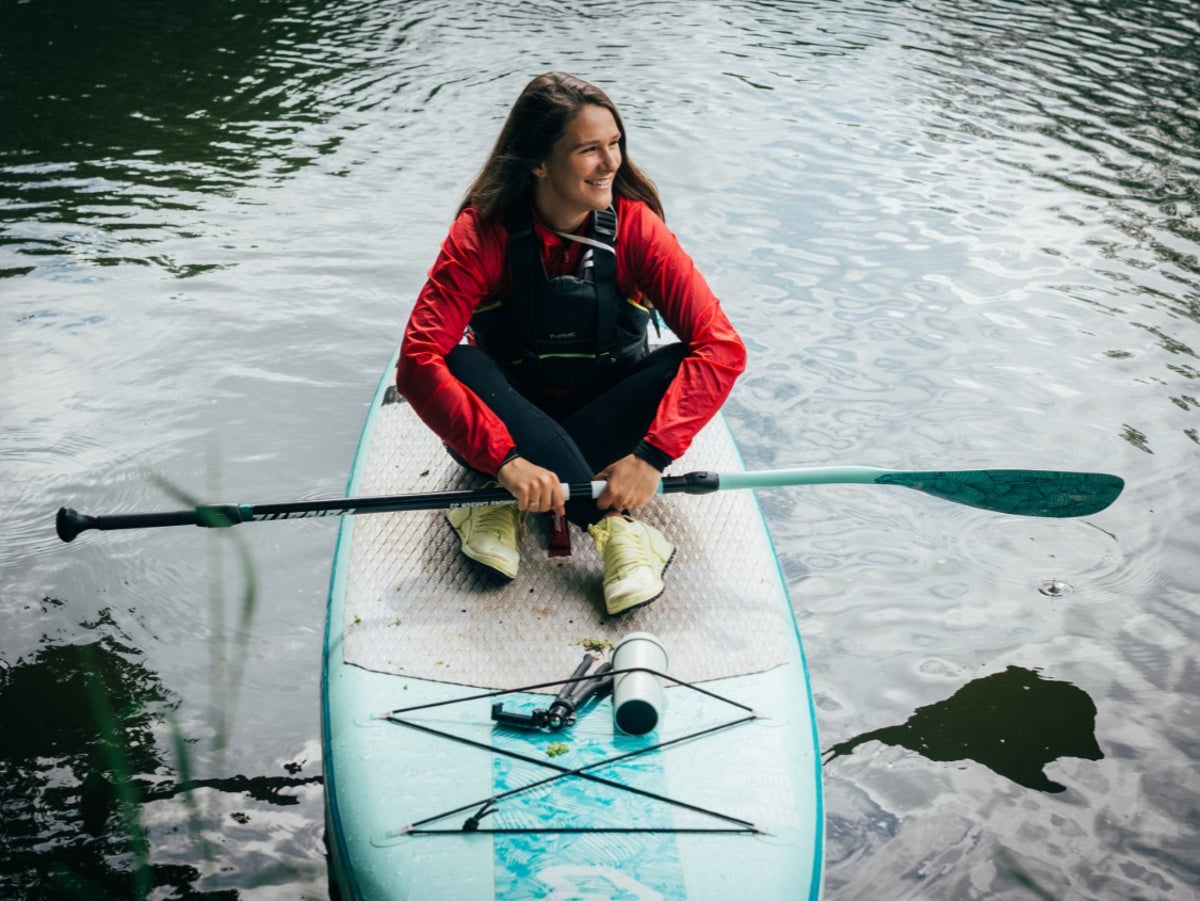
No one should expect to get ill from their local waterway.
That’s the view of Lizzie Carr MBE, the environmentalist and first person to paddle board the length of England’s waterways, solo and unsupported.
Having first shone a spotlight on the plastic pollution in and around England’s waterways, Carr is now focusing her attention on water quality after she got sick training on the River Trent.
“Everybody in watersports jokes about not falling in the river and having a can of coke when you get out to kill off anything,” she said. “It’s sad that that’s been normalised – that you should expect to get ill from going in your local waterway.”
And so in catching a sick bug an idea was born: To focus Planet Patrol, Carr’s environmental non-profit organisation dedicated to tackling the pressing threats of pollution, not just on plastic but water quality too.
On her 22 day journey travelling 400 miles along England’s waterways back in 2016, Carr recorded around 20,000 pieces of litter, later plotting them on an interactive map to demonstrate the scale of the pollution one person can encounter while out on the water.
Now she’s in the process of launching two citizen science campaigns where volunteers can monitor their own local waterways. The first project starts this week as people across the country are invited to spend 15 minutes between Friday October 14 until Sunday October 16 observing their local waterbody and noting down any signs of pollution they see through the Planet Patrol app.
The idea is to run the exercise twice a year in Autumn and in Spring to get a long-term overview of water health and a better understanding of seasonal trends. Then next year Ms Carr plans to launch another campaign “What Lies Beneath” in which citizen scientists can go out and use equipment to test for different pollutants.
Talking toThe Independent this week, Carr said observational data can be a helpful starting point when trying to build up a holistic picture of the state of the UK’s rivers. When paddling along England’s waterways she said she notices sewage discharges, as well as the impact of pollutants on the wildlife, including dead fish.
(Lizzie Carr)
“If you’re going out now and again you can look at those and think they’re just isolated incidents,” she said. “But when you’re someone like me who has paddled a lot … you realise that this is a pattern.”
This summer the scale of Britain’s sewage spill crisis came into the spotlight after swimmers were warned to stay out of the water at more than 50 of Britain’s beaches and new figures revealed raw sewage had been discharged into the environment well over a million times in the past five years.
The Independent revealed that rivers that run through areas of outstanding natural beauty to bathing waters and support populations of salmon, sea trout and shellfish are among the most polluted in England.
But it’s also the things you can’t see that should worry people, said Carr.
“We talk a lot about sewage pollution because that is one of the more visible pollutants, but things we don’t talk about like toxic metals from abandoned and active mines, that’s hugely polluting and that’s completely invisible,” she said. “We should be talking about what we can’t see – that’s what’s really scary.”
Only 14 per cent of English rivers have “good” ecological status and no English river has “good” chemical status.
Sampling has also declined, according toThe Guardian. It cites Environment Agency data that shows testing of rivers in England has fallen from nearly 100,000 samples a year in 2012 to 41,519 in 2021 – the lowest level of sampling in 20 years (apart from the drop-off during Covid in 2020). The Independent has not verified its findings.
Lizzie Carr during a Plastic Patrol clean-up (Jacob King/PA)
(PA Archive)
Ranil Jayawardena, the new Environment Secretary, announced last week that water companies that dump sewage in rivers and seas will face fines of up to £250 million.
The government says it’s pushing water companies to invest more in infrastructure that will minimise pollution, and a spokesperson for the Environment Agency said it was holding the industry to account on a scale “never seen before.”
The agency had recently requested detailed data from over 2,200 wastewater treatment works as part of the biggest investigation it has undertaken into potential permit breaches and where there is evidence of non-compliance will not hesitate to pursue the companies concerned, the spokesperson said.
As Carr embarks on this next chapter of her environmentalism she says she is spurred on by her daughter, River, who was born in 2020.
“I want to feel that my daughter is safe when she goes in the water,” she said. “Right now the thought of her going in her local river and even dipping her toes in it can be quite a scary thought, and I don’t want to feel like that.”
Paddle-boarding helped Carr beat cancer in her mid-twenties and now she wants to help restore the waterways’ health in return.
“I want to advocate for our waterways because they’re such a precious place for me.”
Source link
